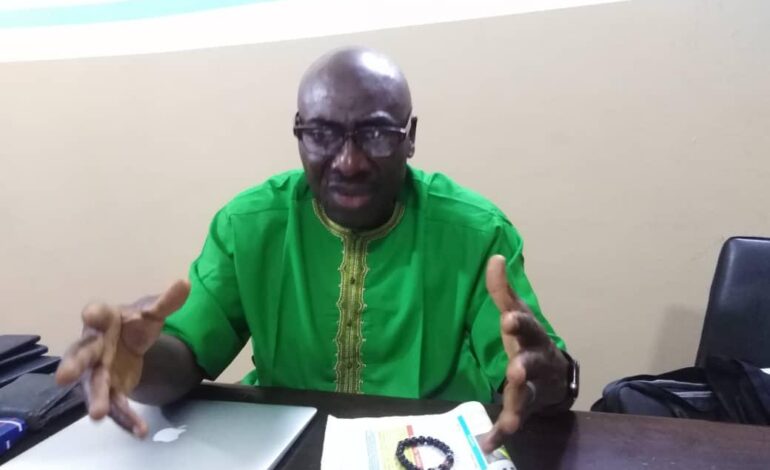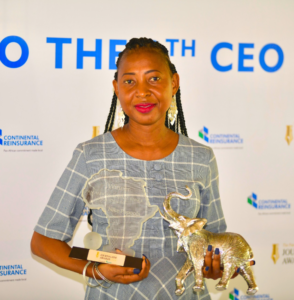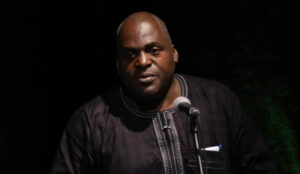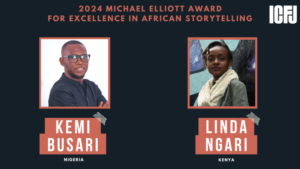Starting out as a campus journalist and student unionist in his university days, Mr Lanre Arogundage has practised as a print and broadcast journalist and is today the Executive Director of the International Press Centre, Lagos.
In this interview with Media Career Development conducted by Adeku Abdulmumini, Blessing Osemobor and Blessed Yovo, Arogundade who is also a human rights activist recalls his media career journey, experience as a press freedom advocate and challenges over the years among other issues.
Congratulations on your 60th birthday. How does becoming 60 make you feel?
We just feel that time flies and obviously, when you are sixty you are thinking that the next phase now is seventy if one is that blessed. So, you are certainly closer to seventy than forty or fifty. I remember that Late Chief Obafemi Awolowo I think when he clocked the age of fifty said that fifty was the youth of old age which is right. So I don’t know how to describe sixty years. So, if Chief Awolowo said fifty was the youth of old age, then I would probably say that sixty is the middle level of old age because certainly, you can no longer be talking about youth. Even if people say you don’t look your age, the reality is that as far as the chronological record is concerned you are sixty. When you suddenly realize this, it instinctively leads you to begin to look back and do a number of reminiscing about how life has been, what you’ve been able to do, and then you are also thinking you know which chapter of this life you will want to document, and so on and so forth.
How has your journalism career experience been over the years?
I think it is quite interesting in the sense that one has been privileged to see journalism evolve. One has been privileged to see the different stages of media evolve as an activist. I started reporting as a vocation at The Republic newspapers in 1998. The newspaper is defunct now. Not that I studied Mass Communication or Journalism, it was just that I was enthusiastic about working in the media having been a campus journalist at the University of Ife, now Obafemi Awolowo University. I know that a person like Mr Lekan Otufodunrin of Media Career Development Network had done a short write-up and probably suggested that we should still look at the phenomenon of the University of Ife. The University does not have a Mass Commination department (at that time) even up till now, maybe there’s even no Communication Arts department at Ife, but yet many of us who went to Ife have since been in the field of journalism.
‘My beginning at The Republic Newspapers’
I started then in The Republic and it was a period when to even to produce a newspaper you come into the newsroom and you write the story. When it comes to the process of even gathering stories, then you probably have one telephone line in the newsroom for calls. If you wanted to take a story from somebody in the outstation or the field you would have to go to the radio room where you will use radio languages like Alpha, Bravo, Romeo and others and write down every word on paper.
Then in the production process, there was a lithographic unit where they have to do the plate and they have to film it. It made it very important then for journalists to have to keep to deadlines. Wherever you were and whatever story you were doing, you have to rush back in time so that you have to be back in the newsroom from 3 pm. You have to start doing your story because the newspaper will have to go to bed at a certain time so that they can be on the street for circulation. So we were doing all that in The Republic Newspapers and I moved to work at the Lagos State Council of the Nigeria Union of Journalists (NUJ) Secretariat briefly as the Organizing Secretary and I was also editing the newsletter of the council, Lighthouse News.
‘My National Concord Newspapers experience’
Later, I went to The National Concord Newspapers which was now a bigger organization and much more modern. We had recording gadgets to do interviews and the rest of them. I also looked back at the newsroom then because one of the things we were doing as journalists was to monitor news because at that time we use to write stories from the Nigeria Television Authority (NTA) broadcast.
We had to listen to NTA at nine and usually they would assign a reporter who would stay there because pronouncements from the government or any form of official statement use to come through the NTA unlike now that the media habits have changed considerably.
Then in the newsroom, we had only one cable station, Cable News Network (CNN) being the one that they could subscribe to. To have CNN then you needed all the satellite dishes that used to be very big. So CNN and the British Broadcasting Corporation (BBC) were the main sources of getting information and foreign news and we had to monitor them.
At the National Concord Newspapers where I was a Line Editor, I attended the editorial conference. We would have one in the morning and then another one in the afternoon. The production of newspapers starts with the production of stories. What do I mean by this? A reporter comes with a story. There were about three categories of reporters then; those that were on different beats like Communication, Aviation, Education and others, those who cover the state house, that is, they cover government house activities, and then those who we call the outstation correspondents in different parts of the country. They would always send in stories that would go to either a chief correspondent in the newsroom which I was initially or to the Assistant News Editor who would look at the story and do some cross-checking of facts while asking you some questions and work on the report to turn it around so as to make it worthwhile for reading.
When they finish working on the story, they will send it to the next person in the editorial chain to take a look at it as it goes to the deputy news editor who would probably okay it or has reasons not to add it to the front page stories. It was compulsory for the news editor to go through them and then pass them on to the editor as one of the stories which would be discussed at the editorial conference.
But for inside pages, there are some inside pages where that allow the deputy news editor to exercise some level of judgement as he could pass stories directly based on whatever reasons.
The point I’m making is that you have a lot of quality control mechanisms back then. As a matter of fact, when your story now even gets to the sub-desk, the sub-editors can still improve on it and so that was the experience then and more or less the same thing even when I went to Vanguard Newspapers.
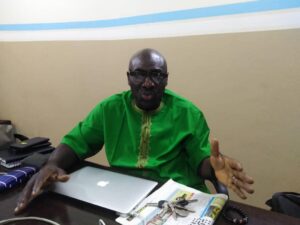
‘Stringer for Voice of America’
Along the line, I veered from newspapers to the radio when I didn’t even know that there was what we will call media convergence today and that was when I became a stringer for the Voice of America. I was actually already working at The International Press Centre (IPC) initially as a coordinator and this was around 2001,2002,2003. What happened was that one of the heads of the English / African service of The Voice of America contacted me. He had come to Nigeria much earlier to do some underground stories on the state of the media under the military and I was the Chairman of the Nigeria Union of Journalists, Lagos State.
I had to provide him with some kind of assistance as we had worked hard together to do some stories. He contacted me and said he was looking for people who could become stringers for The Voice of America and I was suggesting names and he said why not you? I still remember the first story I did for him at the time and this was my transition from newspaper to radio. He said I should do a test story. Just for a short story, I wrote almost three pages. I’m a creative person and he told me to know this is radio. I worked for The Voice of America back then after I had left The Vanguard Newspapers, but today an average reporter does not necessarily have to leave the newspaper completely for the radio.
READ ALSO: Journalists, media houses urged to maximise training opportunities, resources
‘Journalism still remains journalism despite the dynamic changes’
What I can say is that looking at the last 30 years is that I’ve been part of the dynamic changes in the world of the media in the way information technology came and more or less took over in the space such that we are now having a conversation as you know on where do we draw the line of ethics because these days I’ve given you the experience of the newsroom but now you could do your story and it goes online directly.
The newspapers are now 24 hours unlike then when we go to bed from 9 pm, 10 pm. We even had night editors then who would stay back over the night in case there is a major breaking story. But now stories break every second because of the internet, social media and the rest of them, and so it has been quite interesting really. The point I want to make is that having seen it through these phases, journalism through this phase I would just say that journalism still remains journalism, and we have to ensure that journalism remains journalism.
You know the basis of journalism has not really changed and will never change because it’s about gathering information, processing the information and disseminating the information in such a way that will contribute to societal development. If you are talking of media in terms of news reporting, media in terms of entertainment, and media in terms of education, they are all geared towards the same purpose. Journalism is still about the discipline of verification. It’s always been there, it’s what we now call in a more tactful sense, fact-checking. The only thing that we do now is that we are able to do fact-checking using technological tools unlike in those days. What I tell journalists when I do training on fact-checking is that the first fact-checking tool of a journalist is what I call journalistic common sense. That is what makes you a journalist. The fact that you are curious. The fact that you are walking on the street and you meet one, two, three people talking to themselves gives you an idea that are these people crazy or there is something wrong and then you begin to talk to them and maybe they tell you oh it’s because we are frustrated and you have begun to think of economic hardship or maybe many people are at the early stages of mental challenges and so on.
So journalism is still about the discipline of verification. Journalism is about using reliable sources to ensure that you are not misled. So, the struggle now is how to rescue journalism from what we now have and what we call the citizen journalists and all of them and so on. Some of us don’t agree that there should be citizen journalists. People are free to disseminate information, but the moment you start calling them journalists then it’s a different thing. Journalism is governed by a code of ethics. To be a journalist, you work full time. There is a distinction between a working journalist and what we call citizen journalism. So it’s been interesting to witness this radical transformation and the fact that at least one is still relevant in the process.
What has been your driving force in journalism?
The media plays a vital role in a democracy and the media has to be there to continue to play that role. So even though one has not been a full-time practising journalist all the years as I’ve moved to the development sector, it’s still because I’m driven by that passion because the media is unique as it gives you that opportunity to be in a position to influence changes in a society and it makes a lot of difference.
For example, look at the kind of project that we do at the International Press Centre where sometimes we work with communities on the challenges they are facing. I will take journalists to those communities and after visiting the communities we now reach out to the local government chairman and then we say we want to have a town hall meeting and then they turn up. It’s because of the power of the media. And for a person like myself, when I was in the University I was an activist and as NANS president I used to go around newsrooms to drop press statements and grant press interviews.
What has been your experience as an advocate for press freedom?
The experience has also been quite interesting and what I think we should understand is that government generally don’t like negative information about them to be disseminated except for the information that they consider favourable to their interest. To that extent, what we have seen is the type of government also determines the way and manner they try to muzzle the media. So when you look at the military period, it was the fact that the military felt and they were all-knowing. We couldn’t challenge them. It’s about order from above and to the extent that they had to introduce legislation that would kind of tamper with press freedom to borrow the language that then General Buhari used when in one of his famous interviews he said he would tamper with the press.
Before him, we had General Olusegun Obasanjo who equated journalists with dogs and said journalists and dogs were not welcomed and hung the notice on the gate of his farm. From that barrack mentality, there was a lot of attack on press freedom. When the military government of Buhari was overthrown by Babangida, there was Decree 2 which empowers the military government to pick an individual and detain that person indefinitely without any explanation and anybody who was so detained on that decree cannot challenge it in court.
One of the most famous ones was the Decree 4 of 1984 which was targeted at the media and made it an offence for the media to publish any story that embarrasses the government even if the story was true.
So, when Nduka Irabor and Tunde Thompson, then of The Guardian Newspaper did a report on the ambassadorial postings, the government wanted to know the source and they refused to disclose and because of that, the government claimed that the story embarrassed them and the two of them were thrown into detention.
We have faced a similar situation which was why I noted that government generally will not want information that does not promote their interest. So, when our colleagues get appointed as Chief Press Secretaries or are made Commissioners for Information, I’m happy for that person, but I am never part of that excitement because the truth is that while on this side of the divide your job is to get the critical information out of government, but when they move over there, their job is to stop you from getting the information that they themselves used to get or at least make sure that the information that you get and that you use is the one that is favourable to their principals. So they use their experience to breathe on your neck. If they sniff the fact that the story is coming out before you know it they’re calling up the editor, the publisher and so on.
‘Why I’m not excited about journalists as government spokesmen’
So there is a sense in which when our colleagues move to the other side, the reality is that whether people admit it or not, the only thing I can say in quotes is that they become “enemies of the media” and that is just the brutal reality. Not to the extent that some of them don’t help, not that when I say enemy it doesn’t mean that we don’t talk to them, or when there are challenges some of them could help you call and so on and so forth, but when it comes to information, when it comes to media, all they want to see is there principal being called the best.
Their governor must be the best governor in everything and so on and so forth, so we must face that reality. It is because of this problem that we have civilian governments that have been behaving like the military government curtailing press freedom. Now, they are more threatened because of social media. They are more threatened now because it’s so difficult to control their coverage. If the convoy of the wife of a governor drives fast and knocks down a young girl selling groundnut, that information is online in the next few seconds because somebody would have been close by with a camera to snap it and then it goes viral, so it’s a problem for them.
‘Gagging the media, regulation of social media’
So, that’s why we are now having all these attempts to gag the press, to regulate the social media, we have to stop this and then. Also, newspapers publish 24 hours now.
The truth of the matter is that the advent of the internet and social media, despite its negative aspect which we have to admit and talk about now, have a lot of biting effects on them. How do we have some form of regulation for example in terms of spreading hate speeches and others? Despite that, the media today is much more powerful than it was in the past. I think it’s a debate as the people may say oh Nigerian media in the past was great and feared as the government fears the media and so on, the government still fears the media. Technology has made the media to be much more powerful and the reaction to that is that we now have an increasing urge to destroy the press and what we see in all these attempts and so on.
So the Minister of Information must ensure that the National Broadcasting Commission (NBC) does not have independence and they must always act at its will and so the Minister of Information accuses Trust TV of an offence and as such, there is no warning letter as there is no investigation and the NBC the next day says you have been fined five million naira.
So the threat is real. Our responsibility is to ensure that the media remains powerful because without the media you cannot have credible information, and information is defined as the oxygen of democracy. So, when you suppress the media you are denying democracy the lifeline of survival which is information and we have to stop that. What we’ve been doing by way of a fight back is to also say look things cannot happen like this. But it’s not just about confrontation alone and so on, we also believe we have to engage them in dialogue and we will possibly educate the people that there are also best practices that we can emulate and part of this came out at a recent gathering we had in Lagos by the Nigeria Guild of Editors (NGE).
‘Need for Constitutional guarantee for press freedom’
They had a forum in the West Zone of the NGE where we discussed all these issues, and one emerging thrust now is that all of us in the media right now need to fight at least for one thing and that is the issue of constitutional amendment so that our constitution would expressly guarantee press freedom and the right of access to information like we have it in Ghana.
The Ghanaian constitution provides that there shall be press freedom and that no law or actions shall be taken to violate press freedoms. The Ghanaian constitution preserves media independence by saying that editors or Managers of government media shall not be appointed by the government, yes exactly just here in Ghana.
So in the past when we are looking for best practices or best examples to cite in defence of press freedom, we talk about America, maybe like the first amendment to the American nation, but now we can cite the example of Ghana nearby. It wouldn’t mean that we have all these favourable legislations that we will still not have our part. While the press will be free anyway, the other side of the coin, therefore, is that we need to be much more socially responsible.
We need to be much more ethical. We need to be much more professional because that in itself serves as a defence against any accusation. We need to be much more ethical, much more professional because that in itself serves as a defence as it is vital to let our work speak for us.
In your assessment of the Nigerian media landscape would you say that there has been an effective use of the freedom of information act?
No there hasn’t been an effective usage.
What are your observations?
A number of observations. I think firstly, many journalists are yet to see the Freedom of Information Act as a tool for investigative reporting or as a tool for credible reporting or as a tool for factual reporting. It’s a law that enables you as a citizen to apply for information and various categories of information are spread out and it is the law that can help us to see if all those laws that promote good governance in Nigeria are being complied with in terms of the obligations that they quote or certain institutions of the government or the office of the Attorney General, for example, is supposed to monitor what is happening in terms of compliance with the Freedom of Information Act.
There are many questions that we can use to ask but if you are asked to ask and you do not do that then there is a problem.
But we journalists are not asking so I would say the problem is that there is a lack of awareness about the potency of the act and many journalists have not even read the act. I just had a training workshop and when we asked how many journalists have read the FOI Act only two out of a class of 20 and out of the two, one of them was even through the organisation which means media organisations now need to partner with radio and televisions on their own as they should not wait for those of us who come from civil societies. On their own, they should introduce journalists to FOI Act.
The other reason why I think there’s low usage of the act is that people also have this perspective that even if I apply for the information they will not give me and journalism now happens in a hurry because you want to quickly do your story. The FOI Act says they have seven days to give you feedback, so you are asking yourself why the need for a further delay as others will have broken this story and I’m still waiting for seven days. But at the same time if you are doing long-term investigations and you are trying to cross-check some facts through the FOI Act then there is a strong need for it.
There is that feeling that they won’t even give information, that the Government is not open, which means that government itself need to be much more open with information as they need to publicize it very well and the fact that they are complying with FOI means we’re supposed to have FOI officers in all Ministries and agencies and in all departments of the government talking about almost 500 institutions.
Do we have them now?
We have it in some but we don’t have in all of them. But for you and for me that is another thing about usage. Perhaps, also there is the element of fear that if I use this act they could come after me or they will go and investigate and to that extent we also have to try to make journalists understand that they have to weigh their other options when they are making an FOI Request.
‘How to request for request for information using FOI Act’
Do you want to request as an individual which actually is what the act guarantees? It is the right of the citizen to request information and so in requesting the information you are doing so primarily as a citizen since it will not depend on you and your organization.
Whether you want to disclose in your application that you are a journalist depends on you, but it has to be weighed very well. I don’t expect a journalist to do an FOI request and say I need this information because I am doing an investigation.
As a matter of fact, the act does not require you to state the purpose for which you are asking for information. It is just that you need that information. If you like you may not state that I need this information because it is of interest to my community or organization.
But what the law says is you can just pick your pen or through your email and say I need a copy of your report of the panel that your ministry set up to look through. Especially maybe the findings of a report or the white paper on the report. That is what an FOI does. So it has not been impressive. At the level of a civil Society, I think it will be encouraging to see a lot of civil society groups using FOI requests like SERAP and the rest of them. On the part of the citizens, we have also not seen much usage so we need to keep issuing constant wake-up calls for them to use this important legislation.
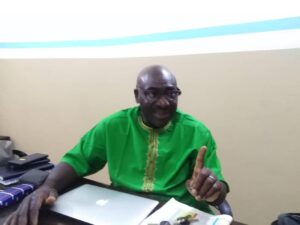
What have been your challenges through the years in the profession?
Well, many challenges. Attacks on press freedom, violation of journalist rights. Journalism comes with a lot of risks. You have to take those risks in their proper contexts. There is also the challenge of having to catch up with the pace of changes in the industry. The challenge of adapting. Twenty years ago when the International Press Centre started, for example, I couldn’t even do anything on the system. Someone had to type for you. Then you had the computer and then you could do the email and then things changed. All other things came along the line. WhatsApp came, Messenger came and all these kinds of things. For you to be relevant as a trainer in those days if you are going to do a presentation all you need to do is have your paper written and then you go and read it and then the PowerPoint came and so on.
I think that constant dynamic change especially in the aspect of technology has been a challenge. And what these challenges want you to do is to adapt and develop, to train so that you’re not left behind. Journalism and technology are not just fast, they are now the fastest moving trains and if you’re not fast enough you won’t be able to catch up and If you are not catching up you could also drop off.
For me, that has been a challenge that one has faced. The other challenge is that it also comes with a lot of risks. Especially the advocacy side where you are doing what you think is right which people there may not necessarily think so. They just think that you are busybodies. So part of the risk you face in being a press freedom advocate is if there is possible surveillance on you by the government and it’s the same experience if you are an activist.
You must have heard the familiar story of how each time I want to travel out of the country, the moment my name flags up in the system then the DSS officers will say go and see that Officer and they will start interviewing me asking where are I’m going and I will have to fill a form where they ask you of my address.
Then they harass and delay me. Harassment has been a challenge until recently when I returned from training in the Gambia and the experience repeated itself until I now got to the point where I was asked to step out of the line with my passport taken and I was taken to the DSS office.
That’s harassment and that was a challenge one has faced on the job. The fact that doing all this leaves some people to want to threaten you in different ways. It was only recently that when a delegation of the International Press Institute, the Nigeria chapter led by Musikiliu Mojeed who is the editor-in-chief of Premium Times met with the Director General of DSS and they were talking about the harassment of journalists and my case now came up and they said my name has been on their watch list since my university days when I was President of National Association of Nigerian students. They now told that delegation that they are now removing me from that watch list after 38 years. So I am 60 and for 38 years of my life, I’ve been on the watch list. So you can do the calculation of how many years that I have left and so to have only been free for 22 years and then for the rest of it I’ve been on the watch list. So you can see why one should just smile and say despite being on the watch list for 38 years I’m here granting this interview.
But I do hope that when next I travel that kind of experience will not repeat itself and that they will honour their own words and their own commitment that my name has been removed from the watch list.
So the challenge is that this kind of risk is what other journalists face all of the time also and we have to face the reality that the moment you’re a journalist and you are asking questions all of the time we must assume certain things could happen. So in that sense, I would say we should learn to take precautions but there is a limit to that.
But that should not discourage the younger people from pursuing their passion as journalists because journalism is a very good profession and things have changed now as there are better opportunities. Maybe one of the things I should have mentioned is that when you were asking if I should take a retrospective view look at my journalism career.
‘There are now many opportunities to excel in the profession’
What I think that I didn’t mention is also to say that the doors are now many to success when it comes to journalism as compared to the time in the past because of so many things that we are doing and that we’re not doing them as the skills that you can have and can be deployed are in many different ways and this includes editing, writing and so on.
Even if you’re not looking at doing other things you can develop yourself academically. I’m happy we have seen journalists who have left the newsroom and gone ahead to become lawyers. We have seen those who continued along the line of journalism and mass communication and obtained a PhD and become Professors of Mass Communications and teaching in institutions of higher learning, especially the university.
You can do all that but you can also say we are still in this profession, develop yourself very well and people who need quality reporting will look for you to come and report for them. I look around and like I told you in our days we only had CNN in our newsroom in the entire country at the time. But look at it now if you have a whole DSTV when you come across as many radio and TV stations all over the world because Nigeria is an important country despite all our challenges and backwardness and the rest of them. Nigeria’s population and location make it an important country in Africa. Whatever happens in Nigeria is of great interest as the Chinese are here, the Americans are here and the Russians are here.
Everybody is here in Nigeria, The Indians are here and they are here not just in the ones and twos but in their thousands which then means that Russian Television, the BBC, of the Voice of America are all here so Nigeria is a country of great interest to them because they have their citizens here.
So they are looking for people to report things here. The field of reporting of event this days has expanded exponentially as I mentioned earlier in our newsroom then we had a Communication correspondent but now we are talking about people who report gender issues, who report climate change and also people who report science and development and their international news organizations that are dedicated to those fields.
Some just focus on science alone. That of sports is well-known and look at it now sport was just a department in the newsroom but now you have videos that are dedicated exclusively to sporting or football-related events and that is the kind of explosion that is seen in my time. That gives me confidence that for every serious young journalist out there this guy can always be the standout.
Where do you think journalism would be based on the transition we have witnessed?
I think that journalism would probably be on another level. I think we would be seeing it in more digitalized format.
I do not share the pessimism of those who feel in ten years the newspapers will no longer be there.
I know that in journalism, the media house is like fashion as suddenly It comes back to stare you in the face.
These days when I want to do something I prefer that it is printed out whereas there was a time when everything was on a computer.
I feel that journalism in ten years would have been redefined because of the media technology.
So the time people spend on stories is not as before. In radio reporting, you must make sense to the people.
Journalism in ten years is also likely to be innovative and it must make sense to the audiences.
What do you think young journalists can learn from your experience?
What they can learn from me is that they should always engage in continuous development. Every day there are a thousand and one seminars.
The missing link is that journalists are not writing enough and we do more documentation of what should be the textbook of the mass communication department in our school as they are the narrative of journalists who have been in the field.
We have in this country those who have covered the government for twenty to thirty years. We also have journalists who have covered two to three governors as we also have journalists who covered the defence beats and we have journalists who covered the Police.
Covering the Police as a beat means you have access to the Inspector General and sometimes you go to those places where they are going for an operation and so on.
You can write as a journalist in Nigeria. You can even write about the problem causing crime. What is needed to report a crime? For somebody who is an investigating crime journalist that becomes a useful tool of the trade? I feel that we are not reading enough. It could be novels, magazines or newspapers.
